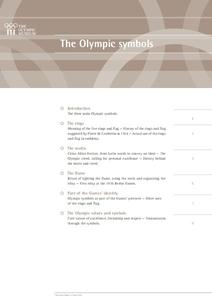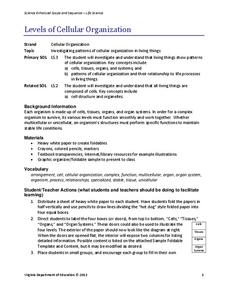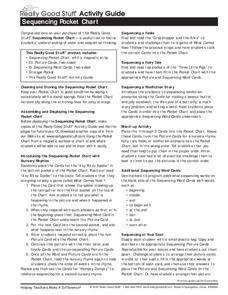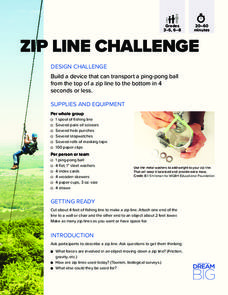US Environmental Protection Agency
Non-Point Source Pollution
Investigate the different types of pollution that storm drain runoff carries into oceans, lakes, rivers, and streams with this class demonstration. Using an aquarium and an assortment of everyday items that contaminants like motor oil,...
Weebly
Definitions of Conduction, Convection, and Radiation
There's quite a bit in this physical science packet. First, how is heat transferred? Learners read a brief explanation of conduction, convection, and radiation before identifying common occurrences (with pictures) as one of the three....
Essential Kids
The Aboriginal Flag
Whether you're celebrating Australia Day or would like to introduce your young learners to the history of Australia and its indigenous peoples, this coloring sheet is a great way to start the conversation.
Jessica Winston
Gingerbread Friends Lesson Plan Guide
Full of activities for Jan Brett's story "Gingerbread Friends," this resource will get your kids in the mood for some snacks, fortify their need for vocabulary, and fill their minds with story elements.
Handwriting Without Tears
Handwriting Without Tears
Does learning to write leave your kindergartners in tears? Use these easy and memorable strategies to guide their pencils in the right direction. With cute illustrations and simple instructions, your learners will be writing paragraphs...
University of the Desert
Why Is Cultural Diversity a Positive Thing?
From more empathetic individuals to greater tolerance in government, learners explore the benefits of a culturally diverse world through a series of collaborative, discussion-based activities.
Olomana School
Mixtures and Solutions: Paper Chromatography Experiment
Why does some ink bleed through paper, and other ink doesn't? Practice some paper chromatography to separate the colors from a pen with an interactive experiment for middle and high schoolers. Learners use a variety of solutions to track...
Olympic Museum
The Olympic Symbols
Get into the Olympic spirit with a resource about the values and symbols of the Olympic Games. With sections about prominent images of the Olympics, including the flame and the interlocked rings, the packet supplies engaging information...
New York State University
Law of Conservation of Energy
Become energy efficient with a presentation that covers the Law of Conservation of Energy with friction. It also includes energy transformations, power, and units of measurement.
Exploratorium
Motor Effect
The magnetic wire. Class members create a magnetic field by running electricity through a wire. The video included in the resource provides information on how this effect is used to make electrical motors.
Teach Engineering
Earthquakes Living Lab: Designing for Disaster
Build and design to rock and roll. Pairs research building design in earthquake areas and use computer simulations to see the effects of earthquakes on buildings,. They then sketch and explain a building design that would withstand...
Virginia Department of Education
Levels of Cellular Organization
What an eccentric way to learn about each level of cellular organization! Allow emerging biologists to utilize white paper and create their own foldable charts to describe each level of organization in the body. You may also adapt the...
Willow Tree
Surface Area of Three-Dimensional Figures
Lateral area and surface area are simple concepts, but calculating them is not as easy! Using formulas, learners calculate lateral area and surface area for the same three-dimensional figures. The resource discusses the formula variables...
Teach Engineering
Mechanics of Elastic Solids
Make the connection between Hooke's law and elasticity with an activity that introduces the class to the behavior of elastic materials. The resource defines stress and strain to calculate the modules of elasticity of...
Teach Engineering
Density and Miscibility
The liquids did not mix — so what do density columns have to do with it? The seventh part in a series of nine provides the theoretical explanation of why density columns do not mix. The lesson covers the topics related to...
National Energy Education Development Project
Exploring Hydropower
In 2006, about 20 percent of the world's electricity was generated from hydroelectric power. In the presentation, scholars review the water cycle and gravitational energy to begin to understand how humans harness the power of water. They...
Really Good Stuff
Sequencing Pocket Chart
Cut it out! Beginning readers practice sequencing skills at home or at school with a variety of activities that require cutting out multiple sets of picture cards and putting them in the correct order.
Teach Engineering
Where Are the Plastics Near Me? (Field Trip)
With a piece of plastic here and a piece of plastic there, here a piece, there a piece, everywhere a piece. Teams go on a field trip in order to document the locations and kinds of plastic trash in an area near them. The eighth...
Teach Engineering
Earthquakes Living Lab: Geology and the 1906 San Francisco Earthquake
We can learn from the past to protect the future. Pairs look at two historical earthquakes: San Francisco, Calif., and Kobe, Japan. Pupils compare the two earthquakes and their impacts, then determine how engineers may use the...
EngageNY
The Relationship Between Absolute Value and Order
Order up a resource on absolute value and order. The 12th installment of a 21-part module investigates the relationship between absolute value and the order of numbers on a number line. Scholars determine how the actual values and the...
Virginia Department of Education
Perfecting Squares
Here's a perfect way to introduce perfect squares. Individuals color in the diagonals of squares and record observations about patterns. They connect their diagrams to exponents of two and perfect squares.
Polar Trec
Ice Cores: Modeling Ice Sheets
Ice cores provide scientists with knowledge of historic melt layers, air temperatures, greenhouse gases, and climate stability. Scholars work in groups to build layers representing snow and ice over thousands of years. Then, groups...
DiscoverE
Make a Light Bulb
Could you reinvent the light bulb? Scholars tap into their inner Thomas Edisons to build a light bulb prototype out of a jar and some wires. They see how long the filament wire glows in the jar (batteries not included) to measure their...
DiscoverE
Zip Line Challenge
Harness the awesome power of gravity. Scholars build a zip line to transport a ping-pong ball. The challenge is to get to the finish line in under four seconds. At that speed, individuals better be sure to strap on the harness!























